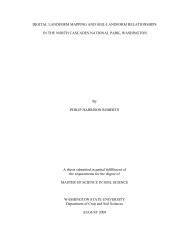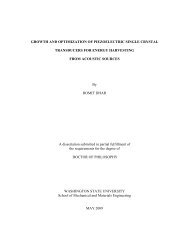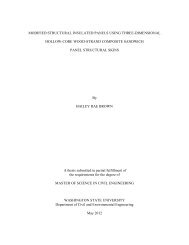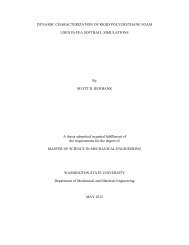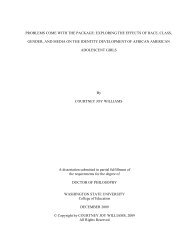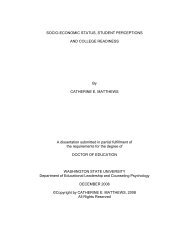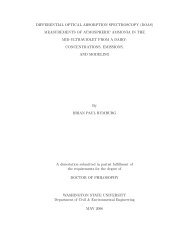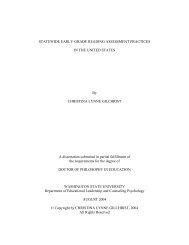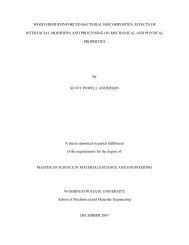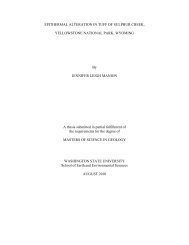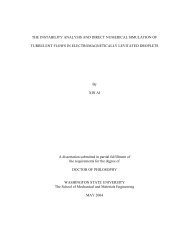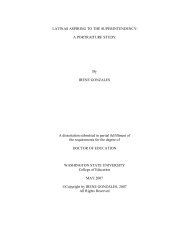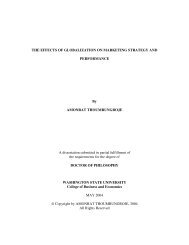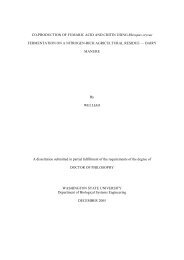the moral reasoning of student athletes and athletic training students
the moral reasoning of student athletes and athletic training students
the moral reasoning of student athletes and athletic training students
Create successful ePaper yourself
Turn your PDF publications into a flip-book with our unique Google optimized e-Paper software.
esearch scored relatively low when compared to <strong>the</strong>ir non-<strong>athletic</strong> <strong>training</strong> <strong>student</strong> <strong>and</strong> non<strong>student</strong><br />
athlete peers suggests that something may be missing from <strong>the</strong>ir educational experiences.<br />
Again, <strong>the</strong> <strong>the</strong>ory that something about <strong>the</strong> competitive nature <strong>of</strong> sport negatively influences <strong>the</strong><br />
<strong>moral</strong> <strong>reasoning</strong> <strong>of</strong> <strong>athletic</strong> <strong>training</strong> <strong>student</strong>s seems valid. The inherent immersion <strong>of</strong> <strong>athletic</strong><br />
<strong>training</strong> <strong>student</strong>s into <strong>the</strong> culture <strong>of</strong> sport allows <strong>athletic</strong> <strong>training</strong> <strong>student</strong>s to compartmentalize in<br />
a manner similar to <strong>athletes</strong>. According to Kohlberg (1975), <strong>the</strong> more one is challenged by o<strong>the</strong>rs<br />
at a higher <strong>moral</strong> level, <strong>the</strong> more one’s viewpoints are shaped <strong>and</strong> changed to reflect a higher<br />
stage <strong>of</strong> thinking. However, if one is surrounded by like thinking, <strong>the</strong>n he or she is not<br />
challenged <strong>and</strong> will tend not to grow beyond oneself. The results <strong>of</strong> this study, in combination<br />
with previous research seem to suggest that it may be valuable to make an intentional effort to<br />
focus educational resources on <strong>moral</strong> <strong>and</strong> ethical decision making as it pertains to <strong>athletic</strong><br />
<strong>training</strong> <strong>student</strong>s’ program <strong>of</strong> higher education.<br />
The samples <strong>of</strong> team <strong>and</strong> individual sport <strong>athletes</strong> were much larger than <strong>the</strong> sample <strong>of</strong><br />
<strong>athletic</strong> <strong>training</strong> <strong>student</strong>s. However, <strong>the</strong> percentages <strong>of</strong> individuals who chose take <strong>the</strong> drug or<br />
can’t decide was just as high, or higher, than for <strong>athletic</strong> <strong>training</strong> <strong>student</strong>s. The notion <strong>and</strong><br />
practice <strong>of</strong> gamesmanship, pushing rules to <strong>the</strong> limit by dubious means without getting caught is<br />
reflected by <strong>the</strong> process <strong>of</strong> rule principled <strong>reasoning</strong>.<br />
Rule Principled Reasoning<br />
According to <strong>the</strong> results <strong>of</strong> this study, it appears that Division I <strong>student</strong> <strong>athletes</strong> <strong>and</strong><br />
<strong>athletic</strong> <strong>training</strong> <strong>student</strong>s do not reason or make decisions from a consistent set <strong>of</strong> <strong>moral</strong><br />
principles. The question is raised <strong>the</strong>n, how do <strong>the</strong>y reason through <strong>the</strong> decision making process<br />
when presented with a <strong>moral</strong> dilemma? This discussion will examine <strong>the</strong> reasons indicated by<br />
respondents as to why <strong>the</strong>y chose take <strong>the</strong> drug, do not take <strong>the</strong> drug or can’t decide.<br />
75



